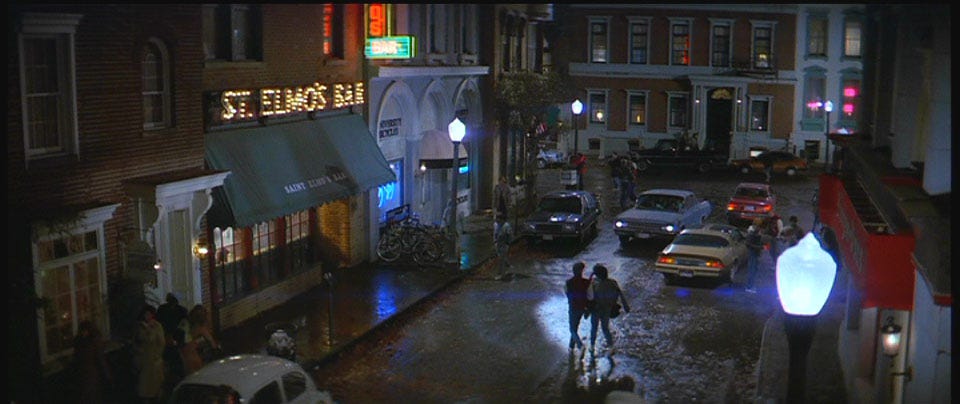I have been thinking a lot about the 1980s. That is not unusual for me. I think about the 1980s a lot, along with sandwiches and finding the softest T-shirts. But the 1980s have been speaking for themselves lately, with the arrival of the Hulu documentary "Brats," directed by a member of the famous group of actors who were dubbed the Brat Pack. The Brat Pack was a group of 20-something actors who were young and beautiful and grew rich and famous by playing characters our generation aspired to become. The director of Brats, Andrew McCarthy, is convinced that this apparently pejorative moniker somehow altered the course of his life. He implies that it changed it for the worse.
My friend wrote online that McCarthy was the least successful member of the Brat Pack. This seems right. His time in the Brat Pack peaked when he played Blane in the exquisite teen film Pretty in Pink, released in 1986. Blane was a rich kid who lacked self-awareness but was somehow aware enough to be conflicted. Nearly 40 years later, Mr. McCarthy is still the perfect Blane. No one should want a Blane once they graduate high school. As the movie's true hero, Ducky (played by Jon Cryer), says to Molly Ringwald's Andie Walsh, "Blane is a major appliance; that's not a name."
There is also some debate about who is a member of the Brat Pack and which films qualify in the Brat Pack genre. You can draw a straight line from Sixteen Candles in 1984, The Breakfast Club in 1985, St. Elmo's Fire in the same year, and Pretty in Pink in '86. All else is periphery.
Of those core films, St. Elmo's Fire catapulted the group into stardom while breaking up the band. The 1985 film follows the post-college angst of a group of Georgetown friends trying to find their way in the world. The cast is a who's who of iconic 80s actors: Judd Nelson, Ally Sheedy, Andrew McCarthy, Demi Moore, Emilio Estevez, Mare Winningham, and Rob Lowe.
The titular St. Elmo is both the patron saint of Mediterranean sailors and the name of the bar where the friends gather. Sometimes, Billy, played by Rob Lowe, plays saxophone in a band there. I felt my age when I realized that the heartthrob of a generation played a sax player to show he was edgy.
The film is about sleeping together and apart, infidelity and loyalty, friendship and ambition. Mr. McCarthy plays Kevin Dolenz, a cynical journalist secretly in love with his best friend's girlfriend, Leslie. Even the plot sounds like a Rick Springfield song. Kevin is disillusioned with his life and struggles to find meaning. He feels deeper than everyone around him. And the rest of us. Kevin rationalizes his feelings because his best friend Alec (played by Judd Nelson) is a lothario who constantly cheats on Leslie. This infidelity deeply offends Kevin, but not enough to stop being friends with Alec.
Kevin's big discovery in the movie is that adulthood is hard. Choosing between the things we want and doing the right thing can suck. It's also the first lesson we learn as children. Or at least we are supposed to. Ultimately, Kevin chooses feelings over friendship and professes his brooding love for Leslie. She smartly responds by choosing herself and leaving both men.
In his documentary, Mr. McCarthy reveals that he quickly fled the Brat Pack and its other members. He feared the moniker "brat" would tarnish his self-image as a serious actor. So, just like Kevin in St. Elmo's, McCarthy abandoned his friends in favor of his feelings. When he attempts to rekindle those friendships with actors he hasn't spoken with in 30-40 years in an attempt to become relevant again, McCarthy comes across like some of the vapid, unloyal characters he has played.
Every coming-of-age story is about self-discovery. In St. Elmo's, each character is on a journey to figure out where they belong. The answer is that friendship matters. Friendship is crucial. Life is hard and requires facing hard truths. Friendships can be the safety net that keeps us out of the abyss.
In the movie, Jules, played by Demi Moore, struggles with drugs and money and spirals throughout the story. Near the end of the film, high on cocaine, she locks herself in her apartment with all the windows opened in some bizarre attempt to kill herself by freezing. The apartment is in disarray, like her life. Most of her belongings have been seized by creditors.
In the end, Jules' otherwise self-centered tribe rallies around her. Rob Lowe's Billy persuades her to unlock the deadbolt to her apartment and consoles her by telling her:
"This isn't real. You know what it is? It's St. Elmo's Fire. Electric flashes of light that appear in dark skies out of nowhere. Sailors would guide entire journeys by it, but the joke was on them...there was no fire. There wasn't even a St. Elmo. They made it up. They made it up because they thought they needed it to keep them going when times got tough, just like you're making up all of this. We're all going through this. It's our time at the edge."
Those Brat Pack movies, in all their cheesy glory, showed us characters who were asking the same questions about life that we were. Some of us saw who we were and who we wanted to be. We found friends going through it and learned to value those friendships. Mr. McCarthy's documentary left me a little melancholy as I realized he had never seen those same things in the movies he was a part of. Then again, when he played Blane or Kevin, perhaps he wasn't acting.
xAP




Hope we can search the movies and watch them again ! Good memories ! 👏👍🏻